Activity by the IMF South Asia Regional Training and Technical Assistance Center (SARTTAC) continued in FY23 Q3 (November 2022 – January 2023) as expected under most of its capacity development (CD) programs. As of end-January 2023, a total of 90 activities took place, representing 55 percent of the number of activities envisaged in the FY23 workplan, with those for Bangladesh, including cohort training on public financial management (PFM), proceeding the closest as planned. Sector-wise, leading the way was region-wide work on PFM, with a major diagnostics mission for Sri Lanka in December 2022; real sector statistics, driven by considerable engagement on price indices and national accounts, including for India; and revenue administration, as discussed later in a feature on the Tax Administration Diagnostic Assessment Tool (TADAT). Selected activities in FY23 Q3 were new in the workplan, notably a TA mission on PFM to Bhutan in November 2022 that provided options to its Ministry of Finance for integrating planning, budgeting, and management functions into a newly restructured ministry, and a national training course on managing fiscal risks for selected Indian states in January 2023. All member countries continued to be well represented in national and regional training by SARTTAC. Most courses were in person, with around 660 officials joining SARTTAC training in the first nine months of FY23, of which around 42 percent were from India, in part reflecting significant cohort training activities, including on selected macroeconomic issues for the Indian Economic Service in November 2022. A new course on Central Bank Digital Currencies in December 2022 also attracted considerable interest. Finally, seven completed TA reports were posted on SARTTAC’s secured website in FY23 Q3.
A highlight of the quarter was a visit to SARTTAC by IMF Deputy Managing Director (DMD) Antoinette Sayeh and her participation in a one-day conference and book launch in New Delhi on South Asia’s Path to Resilient Growth in early January 2023. The visit to SARTTAC provided an opportunity for Center to exchange views with the DMD on ways to strengthen the IMF’s engagement in South Asia. The conference and book launch, co-organized by the IMF Asia and Pacific Department (APD) and SARTTAC, brought together senior-level officials and selected academics and other civil society representatives from the region, as well as senior staff from APD. A highlight was the keynote address by Reserve Bank of India Governor Shaktikanta Das in which he framed opportunities and challenges in South Asia for implementing further reforms to sustain the region’s economic dynamism—currently one of the world’s fastest growing.
During the conference, senior officials from SARTTAC member countries joined a meeting with DMD Sayeh to discuss their agencies’ CD needs and share views on SARTTAC’s engagement in the region. The DMD emphasized the importance of the support of member countries to SARTTAC’s mission, especially as the Center transitions over the next year from Phase I to Phase II of its operations and enters a new funding cycle. On their part, officials welcomed new areas of CD by the IMF in transformational areas, notably related to digitalization and on climate issues. They also looked for SARTTAC’s support on dealing with current vulnerabilities, including elevated debt levels, and recognized efforts by the IMF to continue better integrating CD with surveillance and lending operations.

Meeting between IMF and country officials at South Asia conference (January 6, 2023) (Front row, l - r): Dr. Mohua Roy (Reserve Bank of India), Governor Ali Hashim (Maldives Monetary Authority), Governor P. Nandalal Weerasinghe (Central Bank of Sri Lanka), Governor Maha Prasad Adhikari (Nepal Rastra Bank (NRB)), IMF Deputy Managing Director Antoinette Sayeh, Minister of State for Finance Ismail Ali Manik (Maldives), Anne-Marie Gulde-Wolf (Deputy Director, Asia and Pacific Department (APD), IMF), Ting Yan (Senior Communications Officer, Communications Department, IMF), Amina Lahreche (Advisor, Office of the Managing Director, IMF)
(Back row, l - r): Siddha Raj Bhatta (Deputy Director, NRB), Jarkko Turunen (Deputy Division Chief, APD), Ranil Salgado (Advisor, APD), David Cowen (Director, SARTTAC), Rahul Anand (Division Chief, APD), Bhaswar Mukhopadhyay (Deputy Director, SARTTAC), Krishna Srinivasan (Director, APD)
Looking ahead, SARTTAC staff will work with member country agencies and IMF headquarters to finalize CD workplans for FY24, as well as medium-term commitments under a Phase II program document (PD) for SARTTAC. Updates on this work, as well as execution of SARTTAC’s FY23 workplan and budget, will be provided to member countries and development partners at an interim Steering Committee (SC) Meeting on February 28, 2023. An initial draft of the PD is expected to be completed by the time of the sixth annual SC Meeting, which is slated to take place in June 2023. That document will incorporate some of the recommendations made in the Mid-Term External Evaluation Report on SARTTAC, which is now complete and posted on the Center’s website here.
In the last quarter of FY23, SARTTAC has an active training schedule, including a first-time Macroeconomics of Climate Change course in late April. A complete schedule can be found here.
South Asia Growth Conference and Book Launch and IMF Deputy Managing Director (DMD) Sayeh’s Visit to SARTTAC
The IMF Asia and Pacific Department (APD) and SARTTAC organized a high-level conference and book launch event titled “South Asia’s Path to Resilient Growth” in early January. The event, which coincided with a visit to India by IMF DMD Antoinette Sayeh, took place in New Delhi and was joined by senior officials from India and the region, including from selected central banks and ministries of finance and planning in Bangladesh, Maldives, Nepal, and Sri Lanka. The conference, financed by the government of Korea in support of peer-to-peer learning, provided an opportunity to discuss how South Asia can build on its development success in the aftermath of the COVID-19 pandemic and recent geopolitical tensions to achieve its potential. Focus was on areas viewed as key to sustaining high-quality growth over the medium term—i.e., ways to accelerate income convergence in the region; to leverage the still large potential demographic dividend in most countries; to advance on reform priorities, including climate-friendly policies for sustainable growth; and to cope with heightened vulnerabilities through better macro-financial management.
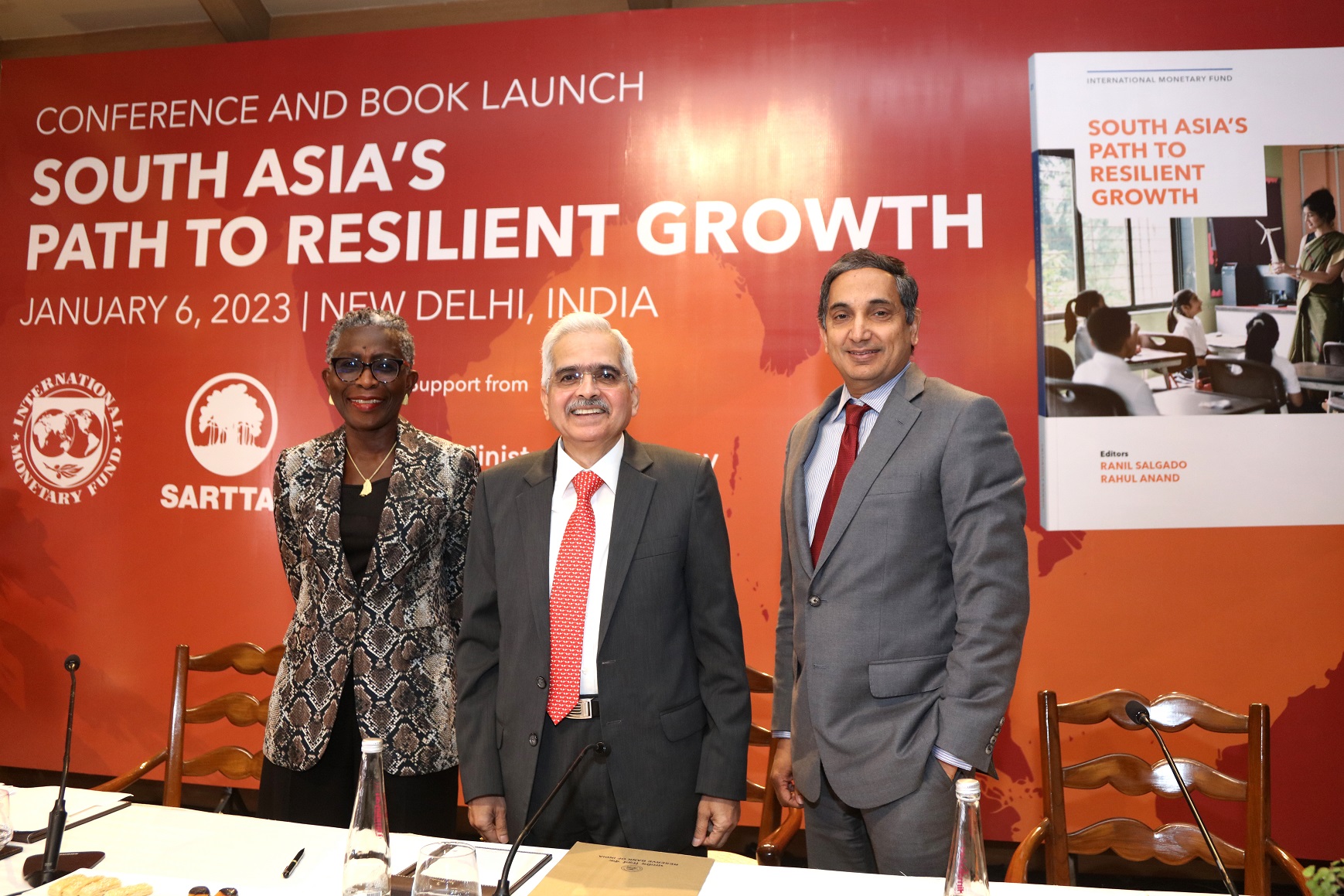
(From left to right) IMF Deputy Managing Director Antoinette Sayeh, Reserve Bank of India Governor Shaktikanta Das and IMF Asia and Pacific Department Director Krishna Srinivasan during the opening session of the conference and book launch on South Asia’s Path to Resilient Growth (January 6, 2023)
The conference brought together high-level participants from the South Asia region. Headlining were DMD Sayeh; Reserve Bank of India Governor Shaktikanta Das, who delivered a keynote address; and APD Director Krishna Srinivasan (to listen to the entire opening session, visit here). In her opening remarks, DMD Sayeh stated that South Asia’s future holds the promise of continued poverty reduction and rapid economic development that could make the region a powerhouse of the global economy. Unlocking this potential, however, requires bold reforms. History had shown that South Asian countries have benefited from reform episodes in the past, and they must build on these earlier successes and emerging opportunities to unleash a renewed dynamism. In his keynote address, Governor Das spoke of how the economic prospects of the region had been dampened by the COVID-19 pandemic and the war in Ukraine war, and the ramifications faced by some counties due to unsustainable debt levels and climate change induced events. However, on the upside, he noted the IMF October 2022 World Economic Outlook, which pegged India, Bangladesh, and Maldives as amongst the fastest growing economies in the world in 2022 and 2023. The Governor also cited recent World Bank estimates on the benefits of enhanced regional cooperation—a win-win for all the countries in the region—as currently intra-regional trade is only one-fifth of its potential.
The conference itself was organized around a newly launched book on ‘South Asia’s Path to Sustainable and Inclusive Growth.’ Leading the main sessions were several editors and authors of the book from APD—Ranil Salgado (former mission chief for India), Rahul Anand (current mission chief for Bangladesh), and Jarkko Turunen (current mission chief for Nepal). Joining throughout the day was a group of high-level panelists, who shared their experiences and observations about growth opportunities and challenges, including remarks by Central Bank of Sri Lanka Governor P. Nandalal Weerasinghe, Nepal Rastra Bank Governor Maha Prasad Adhikari, and Chief Economic Advisor in the India Ministry of Finance V. Anantha Nageswaran. The first session looked at the impact of the pandemic, the post-pandemic recovery and the role of macro-financial management to boost sustainable growth in the region. The second session shed light on the importance of structural reforms and integration into global value chains as a driver of transformation in the region. A session on determinants of sustainable, inclusive and climate-friendly growth and a panel discussion on Strengthening Institutions for Sustainable Growth in the post-COVID World, moderated by Krishna Srinivasan, concluded the conference. A complete agenda, including topics and speakers is available here and an e-copy of the book can be downloaded here.
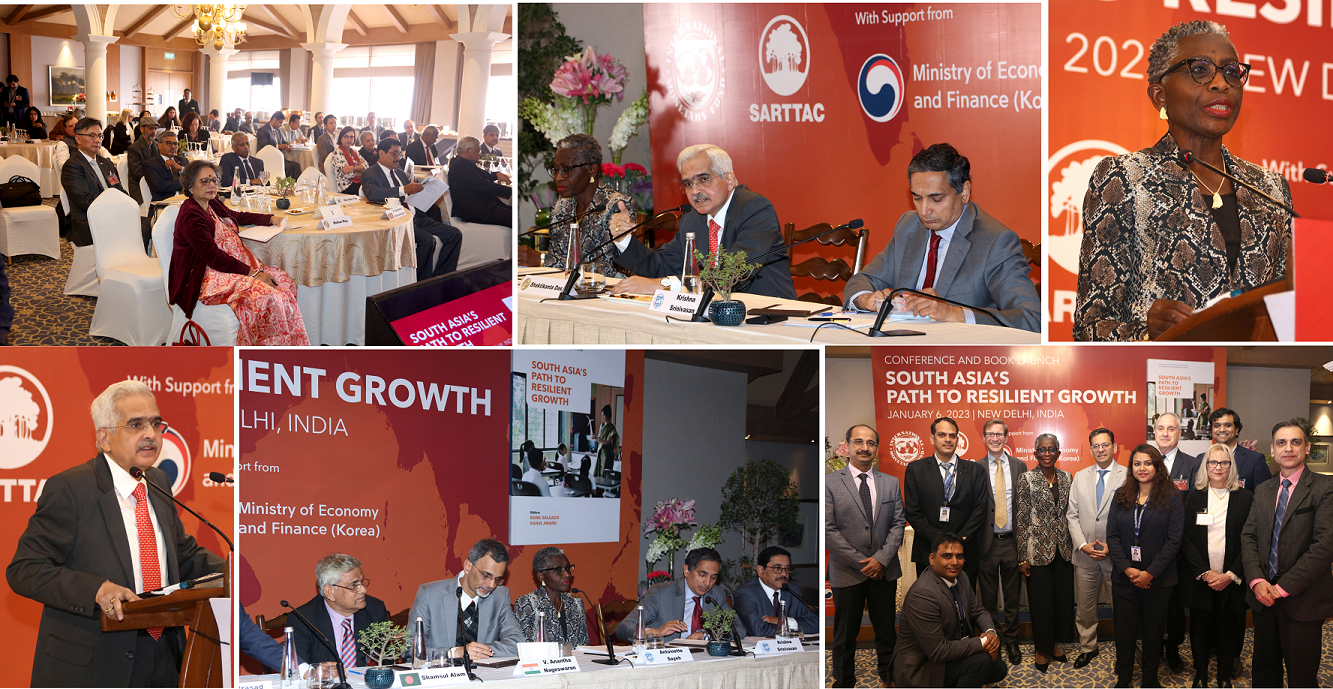
Scenes from the conference and book launch on South Asia’s Path to Resilient Growth (January 6, 2023)
During her visit, DMD Sayed took time out of her busy schedule to visit SARTTAC. Accompanying her was Anne-Marie Gulde-Wolf, Deputy Director of APD and a member of SARTTAC’s Steering Committee. Being in the Center for the first time, the DMD toured SARTTAC’ s office and training wings and met with staff, including over a luncheon. Discussions focused on SARTTAC’s engagement in India and the region, notably in emerging areas of CD, and on work and challenges faced by IMF field offices in returning to normal operations after the pandemic. SARTTAC advisors also apprised DMD Sayeh of the status of delivery Fund CD in the region. She appreciated the Center’s efforts in resuming in-person delivery of CD in 2022, recognizing SARTTAC’s lead on this amongst IMF regional capacity development centers. The DMD also encouraged staff in their preparation for Phase II in SARTTAC in 2023, with her visit to India providing a timely opportunity to reinforce the importance of strong ownership by member countries.
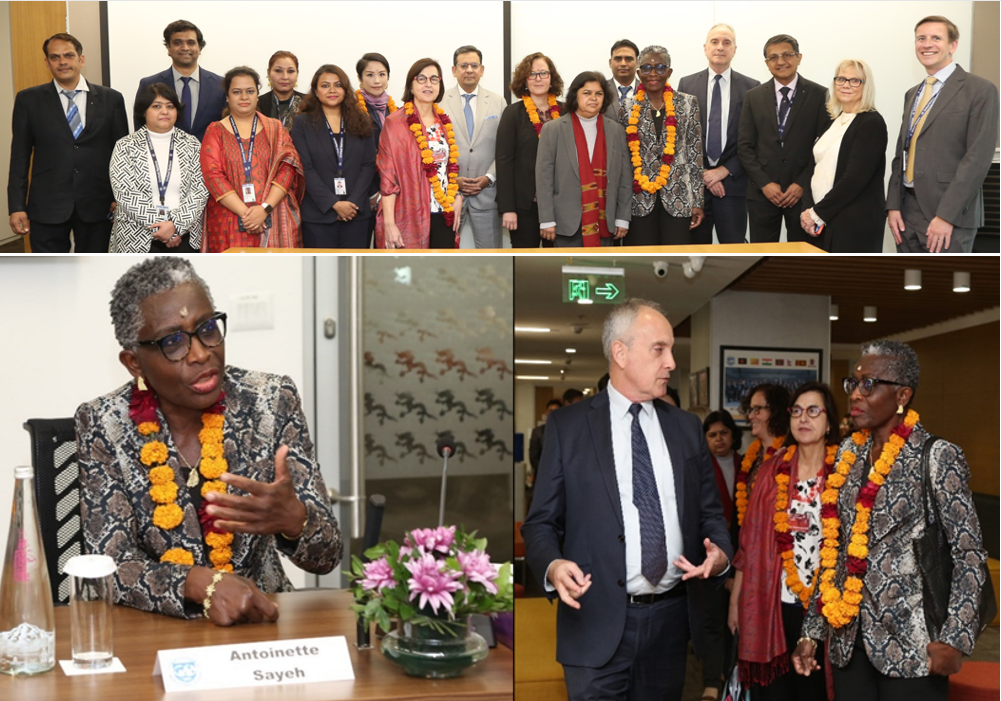
IMF Deputy Managing Director Antoinette Sayeh’s visit to SARTTAC and meeting with its staff (January 6, 2023)
Mr. Ravinder Saroop joined SARTTAC as Revenue Administration Advisor in March 2022. His professional experience spans more than 30 years in various areas of revenue administration and tax policy for the government of India. In SARTTAC, Ravinder coordinates the Center’s TA and training on revenue administration issues, with much of his time during the past year devoted to mission work and training on the Tax Administration Diagnostic Assessment Tool (TADAT) for Bhutan, Nepal, and Sri Lanka. This engagement will be important to setting out tax administration reforms in selected countries and associated capacity development in this area as SARTTAC enters Phase II of its operations in the coming year. Below, Ankit Singh in SARTTAC discusses with Ravinder his experience assessing member country tax administration performance and identifying reform priorities using the TADAT.
Ankit: What is the Tax Administration Diagnostic Assessment Tool (TADAT)?
Ravinder: The TADAT is a standardized means of assessing the health of key components of a country’s tax administration system and its level of maturity in the context of international good practice. It is a global tool that can be used by any country to assess the relative strengths and weaknesses of their tax administration system. The assessment focusses on administration of the major direct and indirect taxes critical to central/federal government revenues, commonly referred to as “core taxes”: corporate income tax, personal income tax, value added tax, domestic excise taxes, and ‘Pay As You Earn’ amounts. Social Security contributions may also be included where they are a major source of revenue and are collected by the tax administration. The TADAT assesses outcomes in relation to the administration of the core taxes in nine performance outcome areas (POAs), using 32 high-level indicators critical to performance.
Why should countries undergo a TADAT assessment? Is it only beneficial for countries experiencing a macroeconomic crisis?
The scoring methodology of TADAT facilitates a shared view on the condition of the tax administration among all stakeholders, such as the country authorities, international organizations, donor countries, and technical assistance providers. This, in turn, helps in setting the reform agenda, including reform objectives and priorities, capacity development (CD) support, and implementation sequencing. Once the assessment is completed, the management and coordination of internal and external support for reforms can be done more effectively and efficiently. Repeat assessments at intervals of two to five years help in monitoring and evaluating the progress of the reforms undertaken. It would be incorrect to say that the TADAT is beneficial only to countries experiencing a macroeconomic crisis. The TADAT covers not only areas critical to revenue augmentation in the short and medium term, such as the compliance pillars and debt collection, but also covers topics such as risk management, dispute resolution, accountability and transparency, and efficient revenue management, which are critical to an overall improvement in efficiency and effectiveness of the tax administration in the long term. In fact, I will go so far as to say that a holistic approach to address the revenue administration areas across the nine POAs can help a country prevent the build-up to a macroeconomic crisis through sustained revenue growth.
What is SARTTAC doing to facilitate TADAT?
SARTTAC is utilizing the TADAT in two significant ways. Firstly, SARTTAC conducts training and accreditation courses for tax officers of member countries. This has created huge awareness among the member country tax administrations about the best international practice in each POA, helping them assess where their current systems stand in comparison. In addition, TADAT accreditation of a sizable number of participants, who qualify in an exam conducted by the TADAT Secretariat at the end of each course, is continuously creating a pool of experts who provide valuable support when a member country undertakes an assessment. Secondly, SARTTAC is contributing to the successful conduct of TADAT assessments in member countries. In FY22 (May 1, 2021 – April 30, 2022), a TADAT assessment was conducted in Maldives, which was followed up with a post-TADAT workshop in November 2022. In FY23, TADAT assessments have been conducted in Bhutan (September 2022), led by the Asian Development Bank (ADB), and in Nepal (December 2022) and Sri Lanka (January 2023), led by the IMF Fiscal Affairs Department. I participated in the exit meeting and post-TADAT workshop in Bhutan and the TADAT assessments in Nepal and Sri Lanka.
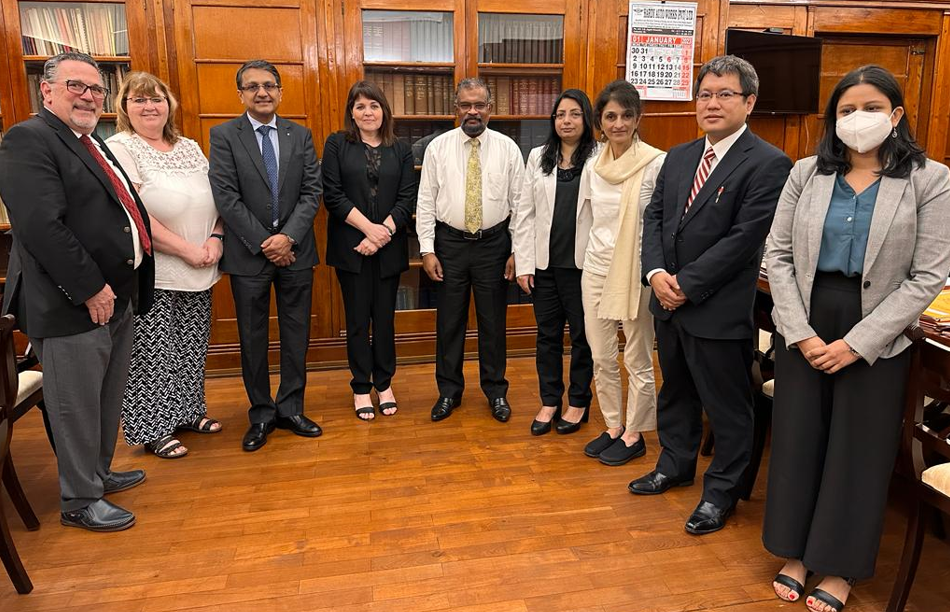
The TADAT assessment team in Sri Lanka met with Mr. Mahinda Siriwardana, Secretary to Treasury (center) during a mission in January 2023.
How will these assessments affect SARTTAC’s work in the region in? In addition, how do they factor into ongoing and future IMF lending programs in the region?
There are significant outputs from the recently conducted assessments. First and foremost, the assessments have made the country authorities aware of the reform areas that they need to prioritize. This imparts clarity to their thinking regarding the sequencing of requests for CD support. Equally, it will help SARTTAC prepare a roadmap for CD support in the upcoming Phase II of its operations, in consultation with country authorities. Secondly, all the assessments were multi-institutional, with participation from IMF, the World Bank and ADB. In post-TADAT discussions, we are trying to identify individual areas of CD support as well as areas where all external development partners (DPs) can collaborate or complement each other’s work. This will help avoid duplication and overlapping of efforts of various DPs.
As regards the TADAT assessments factoring into IMF lending program in the region, I believe that the findings of the TADAT assessments will be relevant in in helping country authorities and IMF teams frame key program-related measures aimed at increasing domestic revenue mobilization through improvements in efficiency and effectiveness of revenue administrations. SARTTAC itself is prepared to provide CD to assist member countries in meeting these commitments as part of our efforts to better integrate the Center’s work with IMF surveillance and lending operations.
Technical Assistance: November 2022 – January 2023
BANGLADESH
Macroeconomics: A mission (January 22-February 1) reviewed the current macroeconomic frameworks being used by the Bangladesh Ministry of Finance (MoF), the related policy decision-making processes and the quality and management of key inputs to the frameworks. These findings will guide future engagement on building institutional macroeconomic analysis and forecasting capacity at the MoF. In addition, the mission team delivered a condensed Financial Programming and Policies training course to officials from the MoF.
Real Sector Statistics: A mission (December 18-22) supported the efforts of Bangladesh Bureau of Statistics (BBS) in compiling Quarterly Gross Domestic Product (QGDP) estimates as part of developing a QGDP program using available high frequency indicators. The mission demonstrated the method of compiling QGDP at current prices for selected activities. It also made recommendations on timing and formats for data sharing between BBS and other agencies and expanding the producer price index.
BHUTAN
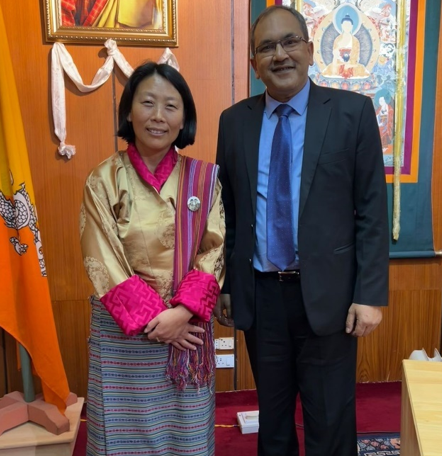
Public Financial Management: Two missions took place in FY23 Q3. The first (November 9-21) supported the restructuring exercise by presenting options for integrating planning, budgeting, and performance/management into the newly created Department of Planning, Budget and Performance in the MoF. This mission was aimed at supporting Bhutan efforts to undertake a far-reaching administrative restructuring of government ministries, which also includes dissolving the Gross National Happiness Commission and reallocating functions to other ministries and agencies. The second mission (November 22-December 2) was part of an ongoing project supporting the modernization of the Chart of Accounts (CoA) and ensuring that it is comprehensive and aligned with the structure depicted in Government Finance Statistics Manual 2014 (GFSM 2014). It assisted the working group responsible for the modernization exercise in presenting the draft CoA segments to stakeholders and suggested coding of the eight segments of the draft unified CoA.
INDIA
Public Financial Management: A mission (January 16-19) conducted in Odisha to review the state government’s management and reporting of fiscal risks (FR) associated with public sector undertakings (PSUs) and to provide support on preparing a PSU FR report to be released with the 2024 budget documents. In Tamil Nadu, a mission (October 31 – November 2) reviewed work by the FR management unit on a FR register and on the preparation of a FR statement to support the implementation of recommendations from previous missions.
Real Sector Statistics: As part of a program to assist the Ministry of Statistics and Programme Implementation (MOSPI) in improving data and compilation procedures for updating the base year of the Gross Domestic Product estimates, a mission (November 14-18) assessed the feasibility of using data from the goods and services tax (GST) network for national accounts compilation. The mission highlighted the importance of data sharing protocols between different agencies and MOSPI and the need for data validation and editing before use in compiling national account statistics.
MALDIVES
Revenue Administration: A mission (November 13-22) conducted a post-TADAT progress review workshop with the Maldives Inland Revenue Authority (MIRA). These workshops were aimed at discussing and agreeing on MIRA’s strategic response to the findings of the TADAT assessment conducted in March 2022 by the IMF Fiscal Affairs Department (FAD) and SARTTAC. The workshops focused on both short-term administrative improvements to mobilize revenue and medium-term improvements that will augment revenue collections within the framework of the medium-term revenue strategy currently under formulation.
Government Finance Statistics: At the request of the Maldives MoF, a mission (January 29-February 2) was conducted focusing on compiling the 2021 GFS data for budgetary central government based on the annual financial statements. It also worked with the authorities on producing high frequency quarterly data and incorporating data from extrabudgetary units.
Real Sector Statistics: A mission (November 11-17) supported the Maldives Bureau of Statistics (MBS) to update the consumer price index (CPI). It focused on reviewing weights for the new CPI based on surveys conducted by the MBS. The mission also identified areas of improvement in surveys to support a CPI weight update exercise. Another mission (December 4-8) assisted the MBS with improving supply and use tables (SUTs), reviewed the status of a GDP rebasing exercise, and assisted in incorporating IMF’s SUT balancing tool as a part of the SUT compilation process.
NEPAL
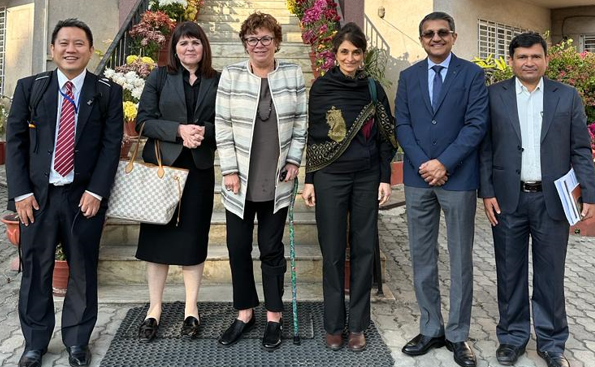
Revenue Administration: TADAT training (November 7-11) for officials from the Inland Revenue Department (IRD) was followed by a TADAT assessment (December 1-15). The training prepared IRD officials for the subsequent assessment and was also attended by officials from the MoF. The mission team collaborated closely with IRD counterparts to determine the current state of its programs and operations across the nine TADAT performance outcome areas. A draft performance assessment report was also provided to the authorities. Officials from World Bank and ADB also participated in the assessment.
SRI LANKA
Revenue Administration: Following training on TADAT delivered by FAD in December 2022, a mission (January 9-26) at the invitation of the of the Secretary to the Treasury, assessed the administration of core taxes using TADAT. The findings of the TADAT assessment will be used to determine Inland Revenue Department reform priorities as it moves forward with modernization. Officials from the World Bank and ADB also participated in the assessment.
Public Financial Management: At the request of Sri Lanka’s MoF, a mission (December 8-20) took stock of the current PFM system. The mission identified the sequence of actions to achieve key PFM reform priorities and capacity development (CD) requirements. In particular, discussions centered on the new PFM Act and strengthening fiscal management, budget formulation and execution, and fiscal data collection and reporting.
Government Finance Statistics: A mission (January 23-27) focused on making progress on timely and higher frequency fiscal reporting. It explored how the Integrated Treasury Management Information System can be used to update the fiscal data compilation framework to one compliant with the GFSM 2014
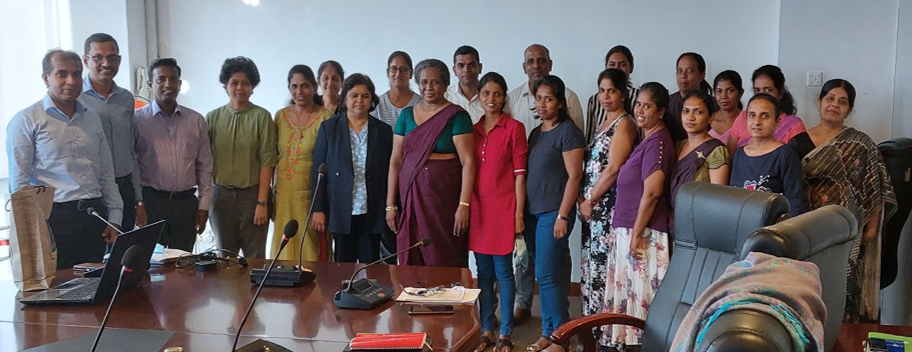
Real Sector Statistics: A mission (November 21-25) assisted the Department of Census and Statistics to develop the institutional sector accounts (ISA) by assessing the availability, quality, and suitability of source data for purposes of compiling annual ISA. Another mission (December 19-23) continued a project on updating the CPI. The mission, conducted remotely, reviewed the current weights and calculation worksheets and assisted in linking the old and new CPIs. Updated CPI weights will improve the representativity of the index and enhance the utility of inflation data for policymaking.
IMF Departments: FAD (Fiscal Affairs), MCM (Monetary and Capital Markets), STA (Statistics)
SARTTAC Funding Programs: FSR (Financial Sector Supervision and Regulation). GFS (Government Finance Statistics), MONOPS (Monetary and Foreign Exchange Operations), PFM (Public Financial Management), RA (Revenue Administration), and RSS (Real Sector Statistics)
Access SARTTAC TA Reports on secure website (Requires Login Credentials)
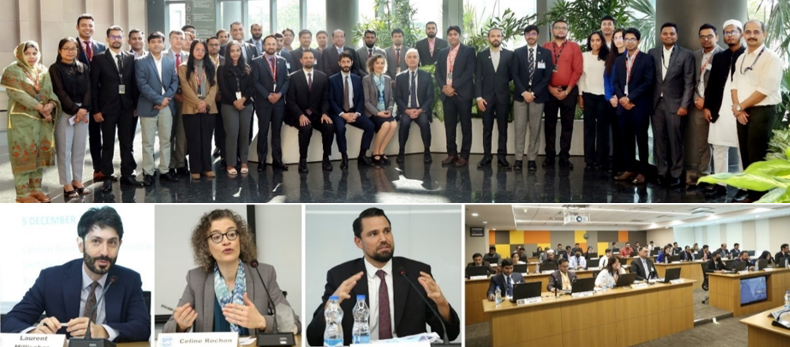
Macroeconomics: A course (December 5-9) was delivered on Central Bank Digital Currencies (CBDCs). It assessed the business case for the adoption of CBDCs from the perspective of both users and central banks. The course also discussed the different forms of CBDCs and presented considerations for their design and conceptual frameworks.
Revenue Administration: A course (December 12-16) on the Tax Administration Diagnostic Assessment Tool (TADAT) introduced participants to the methodology of assessing the efficiency and effectiveness of a tax administration. More information on the methodology can be found in the highlights section on the importance of the TADAT.
Real Sector Statistics: A course (January 16-20) provided participants from national statistical offices and MoFs with broad-based National Accounts Statistics training, including selective advanced issues., addressing common themes and compilations issues emerging from ongoing technical assistance with member countries.
Monetary Policy and Foreign Exchange Market Operations: The seventh segment (January 10-12) in a series of regional courses on monetary policy implementation was delivered on Foreign Exchange (FX) Operations, in collaboration with the IMF Capacity Development Office in Thailand. It discussed rule-based versus discretionary FX operations and the use and transparency of such.
BANGLADESH
Public Financial Management: A third course (December 5-9) in a series of three during FY23 was delivered on Strengthening the PFM Framework for civil servants from Bangladesh, as part of its Institute of Public Finance’s Fiscal Economics and Economic Management course. The training focused on topics like macroeconomic and fiscal frameworks, strategic budgeting, expenditure and revenue forecasts, public investment management, and digitalization issues.
INDIA
Macroeconomics: A second training course (November 14-25) for mid-career Indian Economic Service officers was delivered following the first one in October 2022, with each covering a broad range of macroeconomic issues, with theoretical and analytical concepts framed in a local context to help participants develop a deeper understanding of India's present economic opportunities and challenges.
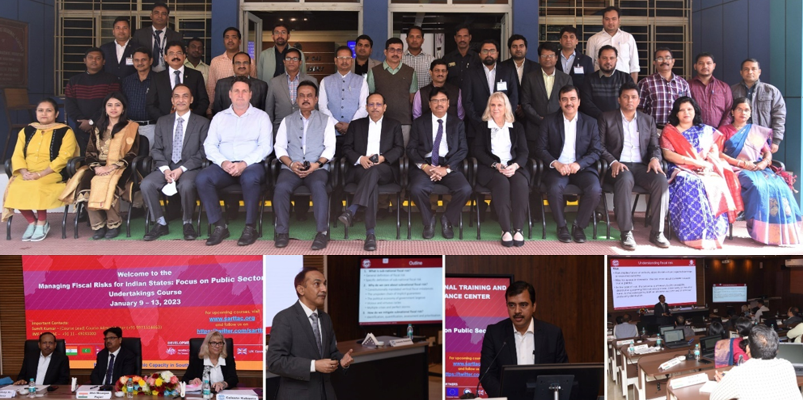
Public Financial Management: A workshop (January 9-13) brought together officials from the Indian states of Odisha, Assam, Chhattisgarh, and Jharkhand on Managing Fiscal Risks for Indian States: Focus on PSUs. The workshop, which was done in partnership with the Finance Department of the Government of Odisha and hosted by its Madhusudan Das Regional Academy of Financial Management in Bhubaneshwar, introduced participants to key IMF fiscal risk tools (IMF Fiscal Risk Assessment Tool and State-Owned Enterprise Health Check Tool)
